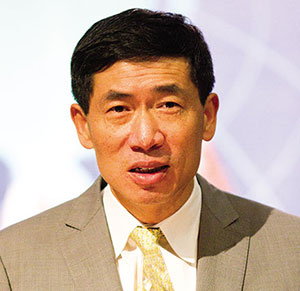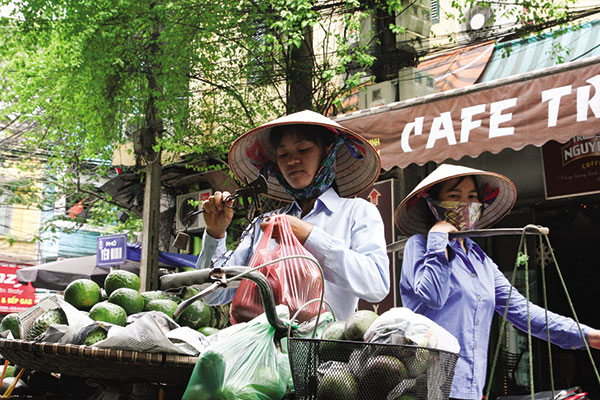Alleviating poverty in wake of great progress
 |
A period of strong economic growth resulted in a dramatic decline in poverty, from around 58 per cent in the early 1990’s to around 7 per cent today. This has earned Vietnam a global reputation for successful social and economic reform.
However, the pace of economic growth in Vietnam has slowed compared to the post-Doi moi years, and disparities among population groups and regions and environmental concerns have grown.
Many have argued that this is rooted in Vietnam’s outdated growth model, which favours the use of cheap labour and natural resource exploitation, over improved productivity and environmental sustainability. But the good news is that Vietnam has hard working people, access to resources and knowledge that can unlock its full potential and deliver a more inclusive and green economy.
Vietnam achieved the vast majority of the UN’s Millennium Development Goals (MDGs). It lifted 43 million people out of poverty; primary school enrollment reached 99 per cent of eligible children; the ratio for boys’ and girls’ school attendance has been equalised; and maternal mortality has been reduced by three quarters. This is an impressive record - yet unfinished MDG business remains, and new social challenges have emerged.
A very large part of the population is vulnerable to income shock. Although not poor, these people are not financially secure. A natural disaster or an economic crisis could pull them back into poverty.
 |
| Vietnam has already pulled 43 million citizens out of poverty |
Vietnam’s rising tide of prosperity did not lift everyone out of hardship. Ethnic minorities have benefited less from economic growth and poverty reduction. While they make up around 14 per cent of the population, ethnic minorities account for more than half of those living below the poverty line.
The characteristics of poverty and the understanding of what it means to be poor in Vietnam are also changing. This is particularly true in urban areas. While absolute income poverty has largely been eliminated, new forms of poverty are emerging. They are given by poor living conditions, limited access to opportunities, and subpar infrastructure and public services.
While the challenges facing Vietnam as a middle-income country are formidable, I am optimistic that they can be overcome. Political will is key - and Vietnam has shown it is serious about eradicating poverty and promoting inclusion. The government has fully committed to implementing the 2030 Agenda for Sustainable Development, and work is underway to develop the right national policy mix.
Importantly, while fiscal space remains tight, with well-adapted set of policy choices that empowers and incentivises the private sector, and bold decisions on public expenditure management are taken, the government can get the job done. The Vietnamese people are skilled and entrepreneurial, and Vietnam has the potential to be one of Asia’s most dynamic economies.
The UN and the UNDP have shared a long partnership with the government of Vietnam. Since 1979, we have supported many major development initiatives, including the globally-renowned Doi moi reforms.
It is vital that we continue to work together.
The route ahead is challenging and, there are three critical sets of tasks, that need our collective attention.
First and foremost, Vietnam needs to revitalise its economic growth model to secure prosperity and opportunity for all Vietnamese and take measures to protect the vulnerable. This can be achieved through better job training, boosting technology transfer, providing equitable schooling and healthcare to improve the quality of human capital, and by developing a social protection system that provides a minimum income for all, from cradle to grave.
Second, ethnic minorities need focused support in the areas of income, job creation, and economic links. These communities must be empowered so they can play a proactive role in their own development. Attention should be paid to promoting family and community empowerment and a self-help spirit.
There are many useful examples in the region that can be drawn on, like the South Korea’s Saemaul Undong model, which drove rural development progress through community action. The accelerated development targets for ethnic minorities and the reformed national targeted programmes developed by the government in concert with UNDP, offer strong starting points for enabling these communities to access the benefits of development.
Third, tackling new forms of poverty, such as a lack of access to key services, low social protection coverage, and poor living standards, especially in urban areas, requires a new policy response. Encouragingly, here too, Vietnam has become something of a global leader.
UNDP has worked with the government to rollout measures and tools to track and identify these multi-dimensional forms of poverty, and to support disadvantaged households. The work at the national level builds on our successful partnership in Ho Chi Minh City, where authorities have pioneered these modern approaches.
These solutions demonstrate that Vietnam remains on the cutting-edge of poverty reduction. Moving forward, our collective ability to innovate, scale up, monitor, evaluate, and of course, to quickly adjust course of action will be critical to achieving the Sustainable Development Goals.
As former Prime Minister Nguyen Tan Dung said, the UN has helped Vietnam significantly to improve its institutional capacities, deliver administrative reform, eradicate poverty, and promote sustainable development and to respond to climate change. UNDP remains committed as ever, to supporting Vietnam in its efforts to ensure a green and poverty-free future, and to delivering prosperity for all its citizens.
What the stars mean:
★ Poor ★ ★ Promising ★★★ Good ★★★★ Very good ★★★★★ Exceptional
Latest News
More News
- Vietnamese businesses diversify amid global trade shifts (February 03, 2026 | 17:18)
- Consumer finance sector posts sharp profit growth (February 03, 2026 | 13:05)
- Vietnam and US to launch sixth trade negotiation round (January 30, 2026 | 15:19)
- NAB Innovation Centre underscores Vietnam’s appeal for tech investment (January 30, 2026 | 11:16)
- Vietnam moves towards market-based fuel management with E10 rollout (January 30, 2026 | 11:10)
- Vietnam startup funding enters a period of capital reset (January 30, 2026 | 11:06)
- Vietnam strengthens public debt management with World Bank and IMF (January 30, 2026 | 11:00)
- PM inspects APEC 2027 project progress in An Giang province (January 29, 2026 | 09:00)
- Vietnam among the world’s top 15 trading nations (January 28, 2026 | 17:12)
- Vietnam accelerates preparations for arbitration centre linked to new financial hub (January 28, 2026 | 17:09)
















 Mobile Version
Mobile Version